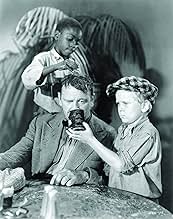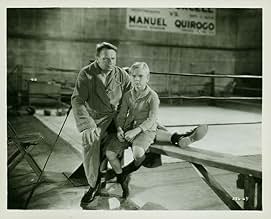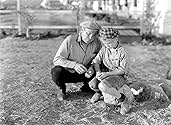NOTE IMDb
7,2/10
3,8 k
MA NOTE
Ajouter une intrigue dans votre langueAn alcoholic ex-boxer struggles to provide a good living for his son.An alcoholic ex-boxer struggles to provide a good living for his son.An alcoholic ex-boxer struggles to provide a good living for his son.
- Réalisation
- Scénario
- Casting principal
- Récompensé par 2 Oscars
- 5 victoires et 3 nominations au total
Roscoe Ates
- Sponge
- (as Rosco Ates)
Dannie Mac Grant
- Boy Taunting Dink
- (non crédité)
Frank Hagney
- Manuel Quiroga - Mexican Champ
- (non crédité)
Dell Henderson
- The Doctor
- (non crédité)
Tom McGuire
- Los Angeles Promoter
- (non crédité)
Walter Percival
- Los Angeles Promoter
- (non crédité)
Lee Phelps
- Louie - the Bartender
- (non crédité)
Andy Shuford
- Boy at Racetrack
- (non crédité)
Dan Tobey
- Ring Announcer
- (non crédité)
Avis à la une
this is one touching,heartwarming movie.it's all about the love a father has for his son and vice versa.Wallace Beery is good as the dad,but it's Jackie Cooper(nine years old,at the time)who steals the show)as the son.as a nine year old child,Cooper showed acting ability and maturity way beyond his years.this film has little to do with boxing,and in fact,the one big boxing scene is quite comical,and not in a good way.thank goodness,it secondary,and doesn't lesson the overall impact of the movie.the ending is unexpected and hit me like a punch to the gut.it's a powerful moment,and deeply affecting.for me,The Champ(1931)is a 7/10
'The Champ' seems to have been a blueprint film for all the others of the tough-tender school that followed it, and - owing entirely to Jackie Cooper's playing perfectly off of Wallace Beery's has-been, alcoholic pug - it's perfectly charming.
Yes, the fight scene is rather hokey: had they tried to use Wallace Beery's telegraphed-the-day-before roundhouse punches, even the toe-to-toe sluggers of 'The Champ's bygone day wouldn't have survived one round in the ring. But the film isn't about the fight scene, it's about the love of father for son and son for father - and to this day 'The Champ's' story artfully delivers its soft knock-out blow with tender sucker punches and love-taps to the heart.
Compared with today's fare 'The Champ's' pacing is slow but the time taken works nicely, especially in the one-on-one scenes captivatingly played by Cooper and Beery.
There's plenty of archetypal King Vidor composition-in-frame that's still imitated today, and in many instances the lighting is exemplary of the gorgeous black & white textural artistry of Hollywood's Golden Age. Lovers of classic B&W work might want to grab more than a few frames from the DVD.
Beery's work is quite good here, but Jackie Cooper's remarkable, potent chops steal the show - and your heart; though 'The Champ' has a good many fine, classical attributes there's none better in it than Cooper's unforgettable performance.
Yes, the fight scene is rather hokey: had they tried to use Wallace Beery's telegraphed-the-day-before roundhouse punches, even the toe-to-toe sluggers of 'The Champ's bygone day wouldn't have survived one round in the ring. But the film isn't about the fight scene, it's about the love of father for son and son for father - and to this day 'The Champ's' story artfully delivers its soft knock-out blow with tender sucker punches and love-taps to the heart.
Compared with today's fare 'The Champ's' pacing is slow but the time taken works nicely, especially in the one-on-one scenes captivatingly played by Cooper and Beery.
There's plenty of archetypal King Vidor composition-in-frame that's still imitated today, and in many instances the lighting is exemplary of the gorgeous black & white textural artistry of Hollywood's Golden Age. Lovers of classic B&W work might want to grab more than a few frames from the DVD.
Beery's work is quite good here, but Jackie Cooper's remarkable, potent chops steal the show - and your heart; though 'The Champ' has a good many fine, classical attributes there's none better in it than Cooper's unforgettable performance.
Father/son movies were nothing new when November 1931's "The Champ" was released. But its ending is what struck movie audiences as unique, one of cinema's most potent tear jerkers ever projected on the screen. "The Champ is one of the greatest love stories ever put to film, the story of a man who wants to do right but fails and a son who never gives up on him," film reviewer Jerry Roberts writes. "(Wallace) Beery is what gives the film its foundation."
Beery performance was so powerful he won the 5th Academy Awards' Best Actor in a virtual tie with Frederic March for his role in 1931's "Dr. Jekyll and Mr. Hyde." After receiving the statuette, Berry, in the middle of renegotiating his contract with MGM, demanded he be paid one dollar more than the studio's highest paid actor. The agreement made him the richest salaried Hollywood actor at that time. Francis Marion wrote "The Champ's" screenplay especially with Beery in mind. It proved to be a great inspiration since she won the Academy Award's Best Story for her work on bringing bucketful of tears to millions of viewers.
Her tale has Andy "Champ" Purcell (Beery), a former world heavyweight title holder, down on his luck and turns to drink and gambling. Through his divorce, Andy was able to keep his son, Dink (Jackie Cooper), until his mother Linda (Irene Rich), sees him at the racetrack with his father. Remarried into wealth, Linda gets the court to gain custody of Dink. In a classic highly emotional separation scene, Andy, in prison, says goodbye to his loyal son, only to have Dink jump off the train transporting him to his mother's home. He wants to see his father fight one more match facing off against the Mexican champion in what turns out to be a brutal match. A preview audience loved the movie, except for the ending. MGM's head of production, Irving Thalberg, had the match reshot, ending with one of the most emotional 18-handkerchief scenes in cinema.
Despite the warmth displayed on the screen between the two actors, Beery and Cooper did not get along. Beery hated childhood actors, and it was evident he didn't enjoy his time with the nine-year-old Jackie. Publicly, he diplomatically described Cooper as "a great kid," but the boy claimed the actor treated him like "an unkempt dog." In retrospect, Cooper said it was pure jealousy that made Beery, in scene after scene, try to upstage him. Beery was so fed up with the director calling for tight shots of Cooper's teary face, he demanded in his new MGM contract that no juvenile actor could ever have a close-up in any picture with him. Beery vowed he would never appear in another movie with Cooper again after "The Champ" wrapped. But so popular was the acting duo that he took back his promise in the mid-1930s, sharing screen time again with Cooper in three more films.
Besides Beery's tied win, the Academy nominated "The Champ" for Best Picture as well as its director, King Vidor for Best Director. Francis Marion's award-winning script was so brilliant Red Skelton adapted it into his 1952 film, "The Clown," where he plays the Andy character as a has-been clown rather than a boxer. Later generations are more familiar with director Franco Zeffirelli's 1979 version of "The Champ" with Jon Voight, Faye Dunaway and Ricky Schroder as the son. This film was actress Joan Blondell's last movie.
Beery performance was so powerful he won the 5th Academy Awards' Best Actor in a virtual tie with Frederic March for his role in 1931's "Dr. Jekyll and Mr. Hyde." After receiving the statuette, Berry, in the middle of renegotiating his contract with MGM, demanded he be paid one dollar more than the studio's highest paid actor. The agreement made him the richest salaried Hollywood actor at that time. Francis Marion wrote "The Champ's" screenplay especially with Beery in mind. It proved to be a great inspiration since she won the Academy Award's Best Story for her work on bringing bucketful of tears to millions of viewers.
Her tale has Andy "Champ" Purcell (Beery), a former world heavyweight title holder, down on his luck and turns to drink and gambling. Through his divorce, Andy was able to keep his son, Dink (Jackie Cooper), until his mother Linda (Irene Rich), sees him at the racetrack with his father. Remarried into wealth, Linda gets the court to gain custody of Dink. In a classic highly emotional separation scene, Andy, in prison, says goodbye to his loyal son, only to have Dink jump off the train transporting him to his mother's home. He wants to see his father fight one more match facing off against the Mexican champion in what turns out to be a brutal match. A preview audience loved the movie, except for the ending. MGM's head of production, Irving Thalberg, had the match reshot, ending with one of the most emotional 18-handkerchief scenes in cinema.
Despite the warmth displayed on the screen between the two actors, Beery and Cooper did not get along. Beery hated childhood actors, and it was evident he didn't enjoy his time with the nine-year-old Jackie. Publicly, he diplomatically described Cooper as "a great kid," but the boy claimed the actor treated him like "an unkempt dog." In retrospect, Cooper said it was pure jealousy that made Beery, in scene after scene, try to upstage him. Beery was so fed up with the director calling for tight shots of Cooper's teary face, he demanded in his new MGM contract that no juvenile actor could ever have a close-up in any picture with him. Beery vowed he would never appear in another movie with Cooper again after "The Champ" wrapped. But so popular was the acting duo that he took back his promise in the mid-1930s, sharing screen time again with Cooper in three more films.
Besides Beery's tied win, the Academy nominated "The Champ" for Best Picture as well as its director, King Vidor for Best Director. Francis Marion's award-winning script was so brilliant Red Skelton adapted it into his 1952 film, "The Clown," where he plays the Andy character as a has-been clown rather than a boxer. Later generations are more familiar with director Franco Zeffirelli's 1979 version of "The Champ" with Jon Voight, Faye Dunaway and Ricky Schroder as the son. This film was actress Joan Blondell's last movie.
Former heavyweight champ Andy Purcell goes down to Tijuana in hopes of getting a fight. Andy's son, Dink, watches his father train, but Andy gives into his vices of gin and gambling, which constantly gets him in trouble. Andy wins Dink a race horse, which is entered in a race, where Andy meets his ex-wife Linda (with her current husband Tony) at the track and wants to be reunited with her son (Dink) and give him a better life outside of the one Andy gives him. Andy gets arrested and thrown in jail, where he decides that Dink would be best living with his mother, which devastates Dink (who idolizes his father). Andy is released from jail (thanks to Tony & Linda)and gets a bout with the Mexican heavyweight champ, where Dink runs back to his father to watch him hopefully win the fight, even though he is out of shape and not at the level of his opponent. The film is a toughing piece of cinematic brilliance, despite the static camera-work (very uncharacteristic of King Vidor). Beery and Cooper work so well together and their performances are what makes this film a classic. The script does not lose anything in the 70 plus years since its release. If the ending doesn't make you shed tears, you have to be a robot. Rating, 8.
The central relationship of the adoring street-wise kid (Cooper) and his devoted, boozing, gambling ex-champ Dad (Beery) is astonishing. We are observing behavior here, not acting. Cooper gives the best child performance I've ever seen and Beery is utterly human, flawed and unforgettable.
This film is full of terrific moments - comedy and heartbreak. The friendship between Cooper and his black pal is beautifully color-blind. When Cooper states, "He's colored," it's with a child's open, untainted honesty. I find King Vidor's films to always resonate with humanity and compassion. He was one of our greatest filmmakers as Frances Marion was one of our greatest screenwriters.
This film is full of terrific moments - comedy and heartbreak. The friendship between Cooper and his black pal is beautifully color-blind. When Cooper states, "He's colored," it's with a child's open, untainted honesty. I find King Vidor's films to always resonate with humanity and compassion. He was one of our greatest filmmakers as Frances Marion was one of our greatest screenwriters.
Le saviez-vous
- AnecdotesWallace Beery actually got one less vote than Fredric March in the 1931/1932 Academy Awards voting for best actor, but the rules at the time considered anyone with one or two votes less than the leader as being in a tie. So both got Academy Awards.
- GaffesAs Dink plays on the balcony awaiting his meeting with Linda, he steals chewing gum and candy for himself off of a table on the balcony. He then steals the contents of a box of cigarettes, saying that he'll "bring some home for the Champ", and stuffs them into his right jacket pocket. However, during the ride home, Andy reaches into Dink's right jacket pocket and finds cigars rather than the cigarettes which we clearly saw Dink steal.
- Citations
[Dink compares the swanky home to his own]
Dink Purcell: The Champ and I ain't fixed up swell as this, but our joint's more lively.
- ConnexionsEdited into The Our Gang Story (1994)
- Bandes originalesThe Monkeys Have No Tails in Pago Pago
(uncredited)
Composer uncertain
Sung a cappella by Wallace Beery
Meilleurs choix
Connectez-vous pour évaluer et suivre la liste de favoris afin de recevoir des recommandations personnalisées
- How long is The Champ?Alimenté par Alexa
Détails
- Durée1 heure 26 minutes
- Couleur
- Rapport de forme
- 1.20 : 1
Contribuer à cette page
Suggérer une modification ou ajouter du contenu manquant

Lacune principale
By what name was Le champion (1931) officially released in India in English?
Répondre




































